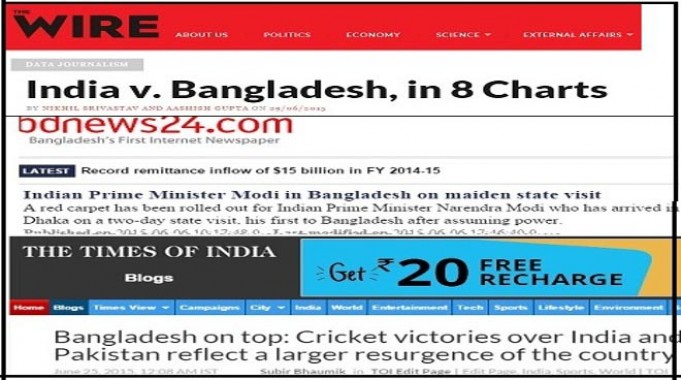Stop the country cousin treatment
Bangladesh's leading editor, Mahfuz Anam, once complained that India had two neighbours and Bangladesh was not one of them. He was alluding to China and Pakistan, with whom India seemed to be obsessed. Very few Indian newspapers, TV channels or magazines ever cover Bangladesh seriously, missing out on major developments in the country that National Security Advisor Ajit Doval described in May as India's 'most important neighbour'.
None of the top newspapers have a regular correspondent in Dhaka except the Hindu. None of the TV channels have a regular stringer who could do phone interviews or tracks when a big story breaks.
The PTI has a correspondent based in Bangladesh Sangbad Sangstha (BSS) on a reciprocal arrangement and the IANS has a news exchange deal with Dhaka’s bdnews24.com. So the Indian media relies far too much on the likes of AP, AFP or Reuters to cover our 'most important neighbour'.
The bdnews24.com has three stringers in India - in Delhi, Agartala and Guwahati - and three editors working online for their English website from Calcutta and doubling as correspondents when stories break.
Most big Bangladesh newspapers have two stringers, one in Delhi and one in Calcutta. While small Bengali papers in Silchar and Agartala have regular Dhaka stringers, the Times of India has none.
But Modi's visit to Dhaka brought hordes of Indian journalists to Bangladesh. For the first time in recent memory, one could see substantial Indian media interest and Modi did not disappoint them - or his Bangladesh audience - wherever he spoke.
"He gave what Bangladesh has rarely got from Indian leaders - respect," said Bangladesh commentator Anis Ahmed.
Nonetheless, the focus was clearly more on Modi and not so much on Bangladesh.
That changed with India's cricket debacle. As Mustafizur Rahman skittled India out cheaply in two ODIs with his disguised cutters, there was much soul-searching. Thankfully, for the first time, it was not limited to sports.
The Times of India ran an edit page piece on how the cricket resurgence was no flash in the pan, focussing on the country's emergence into a self-confident nation that had done well in areas like female empowerment and education.
A brilliant and detailed piece by two professors in thewire.inhighlighted eight areas, all key social and human development indicators, where Bangladesh had overtaken India. Even in sanitation, an area Modi seems to give much attention, Bangladesh is far ahead of India .
There were also some good reports that captured the essence of the huge political battle in Bangladesh between liberal Bengali secular nationalists and Islamist radicals over its identity. CNN-IBN carried a lovely documentary on the issue and its reporter took the trouble to get into some Qaumi madrassas that are seen as the breeding ground of Islamist radicals who hack secular bloggers to death.
Thewire.in also took the trouble to speak to Rafida Bonya Ahmed, wife of slain blogger Avijit Roy, when she accepted an online activism award in Berlin on behalf of her slain husband. And the Hindu ran a brilliant editorial driving home the point that Bangladesh is the only nation with a Muslim majority which rejects outright the demand for a Sharia-driven Islamic state.
But as the cricket hangover fades away and Modi's visit already seems like a long time ago, the Indian media is slipping back into the syndrome that upset Mahfuz Anam. Bangladesh is too important for India - its security, its 'Look East ' policy, the economic growth of its eastern and north eastern states - to be wished away. If costs prohibit regular bureaux and Indian staffers, then Indian media houses can easily pick up talented local Bangladesh journalists as local hire staffers.
The Calcutta media could do what their smaller cousins in Agartala and Silchar do, namely, recruit local stringers for regular coverage, especially on issues that matter for a regional audience in eastern India.
From mouth-watering hilsa to Jama’atul Mujahideen Bangladesh terrorists, from real bargain garments to fabulous ceramics, Bangladesh has much to offer, not just for Indians but for the Indian press too.
The focus on Bangladesh should not end with Modi or cricket. Veteran diplomat Rajiv Sikri has rightly argued that India has very little space in the West due to a hostile Pakistan and the volatilities of the Middle East. He says the real space for Indian diplomacy lies in the East and Bangladesh is crucial to it for four reasons:
- Bangladesh is important for India in its efforts to closely integrate its troubled north east;
- It is vital for the security of India's north east as the experience of the last six years since Prime Minister Sheikha Hasina took charge have proved.
- Bangladesh is crucial for facilitating India's ‘Look East’ thrust because this cannot happen through the narrow Siliguri corridor and the roads and ports of Bangladesh are needed;
- Its pivotal position makes Bangladesh crucial for the success of regional cooperation initiatives such as the Bangladesh–China–India–Myanmar Forum for Regional Cooperation (BCIM) and the Bay of Bengal Initiative for Multi-Sectoral Technical and Economic Cooperation (BISTEC);
It is high time, therefore, that the Indian media covered Bangladesh regularly and seriously because this is one country that will matter most for India in the years to come.
(Subir Bhaumik, a former BBC correspondent and founder editor of the now defunct "Seven Sisters Post", is currently senior editor with the Dhaka-based bdnews24.com. He is author of two books on North East India -- "Insurgent Crossfire" and "Troubled Periphery".)
Such articles are only possible because of your support. Help the Hoot. The Hoot is an independent initiative of the Media Foundation and requires funds for independent media monitoring. Please support us. Every rupee helps.







